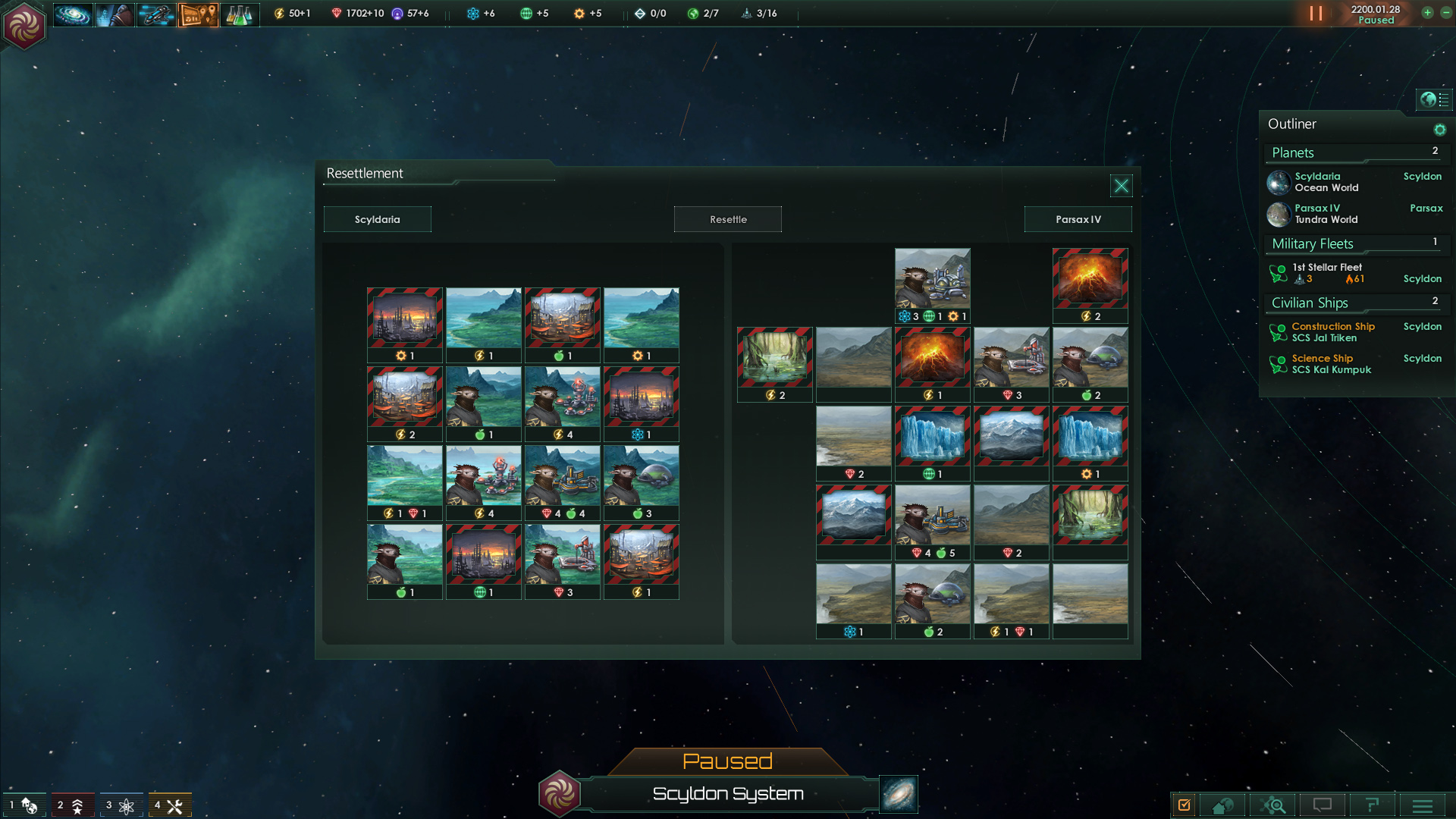Hi folks!
It has been a very busy week for yours truly, with a load of press demos and, of course, the grand Paradox press conference in San Francisco. Meanwhile, the rest of the team has been hard at work finishing up the revised start-up screens, but that’s not what I’m going to talk about today… Instead, through the confused haze of my jet lag, I thought I’d say a few words about how to manage your population in Stellaris! As you might recall from the dev diary on Policies and Edicts, your initial choice of Empire ethos will heavily affect what you can and cannot do and what your initial population will tend to frown upon. Three of the more interesting Policies concern Migration, Slavery and Purges.

Let’s begin with Migration. There are two ways in which Pops can move between planets; spontaneous migration or resettlement. If you are playing a Fanatic Individualist empire, you must allow at least your founding species Pops to move freely as they like (there is an option to disallow alien Pops from migrating - not popular with Xenophiles.) Pops who are allowed to migrate will tend to move to planets they like better than the one they currently live on. This is not just a matter of the Planet Class, but also things like whether the planet has Slaves (which Decadent Pops like), if there are alien Pops on the planet (which Xenophobes dislike and Xenophiles like), and whether the planet lies within a Sector or the core worlds (dissidents and aliens tend to move to Sectors to live with like-minded individuals.) If another Empire is granting you migration access, your Pops will also consider migrating to their planets.
Now, unless you are playing an Individualist Empire, you can also enact a Policy to allow the forcible resettlement of Pops. This will allow you to simply move Pops between planets; at a hefty cost, of course. There is one more way to control migration; fanatic Xenophobes can enact planetary Edicts to strongly discourage xeno immigration. In the same way, fanatic Xenophiles can strongly encourage it...

So that’s basically how migration works. Next, we have Slavery. Like the migration Policies, you have three options; allow it for all Pops, xenos only, or not at all. Fanatic Individualists cannot play with Slavery unless the founding species has the Decadent trait, and only Xenophobes can limit Slavery to aliens. Why use slaves? Well, reprehensible as it is, enslaved Pops are harder workers (but poorer scientists.) Of course, slaves can - and will - join Slave Factions, although Collectivist slaves are more accepting of their lot, for the Greater Good.
Finally, let’s talk Purges, which is simply a way of getting rid of troublesome Pops… permanently. Naturally, this is something that both your own population and other Empires tend to react to rather emphatically.
That’ll have to do for now. Next week, we’re aiming for a more cheerful dev diary about sound and music!
It has been a very busy week for yours truly, with a load of press demos and, of course, the grand Paradox press conference in San Francisco. Meanwhile, the rest of the team has been hard at work finishing up the revised start-up screens, but that’s not what I’m going to talk about today… Instead, through the confused haze of my jet lag, I thought I’d say a few words about how to manage your population in Stellaris! As you might recall from the dev diary on Policies and Edicts, your initial choice of Empire ethos will heavily affect what you can and cannot do and what your initial population will tend to frown upon. Three of the more interesting Policies concern Migration, Slavery and Purges.

Let’s begin with Migration. There are two ways in which Pops can move between planets; spontaneous migration or resettlement. If you are playing a Fanatic Individualist empire, you must allow at least your founding species Pops to move freely as they like (there is an option to disallow alien Pops from migrating - not popular with Xenophiles.) Pops who are allowed to migrate will tend to move to planets they like better than the one they currently live on. This is not just a matter of the Planet Class, but also things like whether the planet has Slaves (which Decadent Pops like), if there are alien Pops on the planet (which Xenophobes dislike and Xenophiles like), and whether the planet lies within a Sector or the core worlds (dissidents and aliens tend to move to Sectors to live with like-minded individuals.) If another Empire is granting you migration access, your Pops will also consider migrating to their planets.
Now, unless you are playing an Individualist Empire, you can also enact a Policy to allow the forcible resettlement of Pops. This will allow you to simply move Pops between planets; at a hefty cost, of course. There is one more way to control migration; fanatic Xenophobes can enact planetary Edicts to strongly discourage xeno immigration. In the same way, fanatic Xenophiles can strongly encourage it...

So that’s basically how migration works. Next, we have Slavery. Like the migration Policies, you have three options; allow it for all Pops, xenos only, or not at all. Fanatic Individualists cannot play with Slavery unless the founding species has the Decadent trait, and only Xenophobes can limit Slavery to aliens. Why use slaves? Well, reprehensible as it is, enslaved Pops are harder workers (but poorer scientists.) Of course, slaves can - and will - join Slave Factions, although Collectivist slaves are more accepting of their lot, for the Greater Good.
Finally, let’s talk Purges, which is simply a way of getting rid of troublesome Pops… permanently. Naturally, this is something that both your own population and other Empires tend to react to rather emphatically.
That’ll have to do for now. Next week, we’re aiming for a more cheerful dev diary about sound and music!

